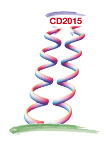Conveners
Parallel Session 5 - Hadron Structure & Meson Baryon Interaction WG
- Martin Hoferichter (TU Darmstadt)
- Andre Walker-Loud (College of William and Mary)
- Patricia Solvignon (University of New Hampshire)
Luciano Libero Pappalardo
(INFN-Ferrara)
02/07/2015, 14:30
Hadron Structure and Meson-Baryon Interaction Working Group
Talk
In the context of rapid theoretical developments in non-perturbative QCD, a formalism of Transverse Momentum Dependent parton distribution functions (TMDs) and of Generalized Parton Distributions (GPDs) was introduced in the last two decades, providing a more comprehensive multi-dimensional description of the nucleon. TMDs and GPDs allow in fact for complementary descriptions of the nucleon in...
Ryan Zielinski
(University of New Hampshire, Dover)
02/07/2015, 15:00
Hadron Structure and Meson-Baryon Interaction Working Group
Talk
The Jefferson Laboratory accelerator has been used to great effect in the study of the polarized structure of nucleons. Measurements of the spin-dependent structure functions have been proven to be powerful tools in testing the validity of effective theories of Quantum Chromodynamics. While the neutron spin structure functions, g1n and g2n , and the longitudinal proton spin structure function,...
Carlos Granados
(Uppsala University)
02/07/2015, 15:20
Hadron Structure and Meson-Baryon Interaction Working Group
Talk
The transverse densities of charge and magnetization in the nucleon are studied at peripheral transverse distances (~O(M_pi^-1)), where they are dominated by chiral dynamics and can be calculated model-independently using ChEFT. The densities are represented as overlap integrals of chiral light-front wave functions, describing the transition of the initial nucleon to soft pion-nucleon (and...
Philipp Wein
(University of Regensburg)
02/07/2015, 15:40
Hadron Structure and Meson-Baryon Interaction Working Group
Talk
We present a leading one-loop calculation in the framework of three-flavor baryon chiral perturbation theory (BChPT) for three-quark light-cone distribution amplitudes, which parametrize the momentum distribution in the leading Fock state and are relevant for the description of hard exclusive processes. Such a calculation automatically yields model-independent results for the leading SU(3)...

